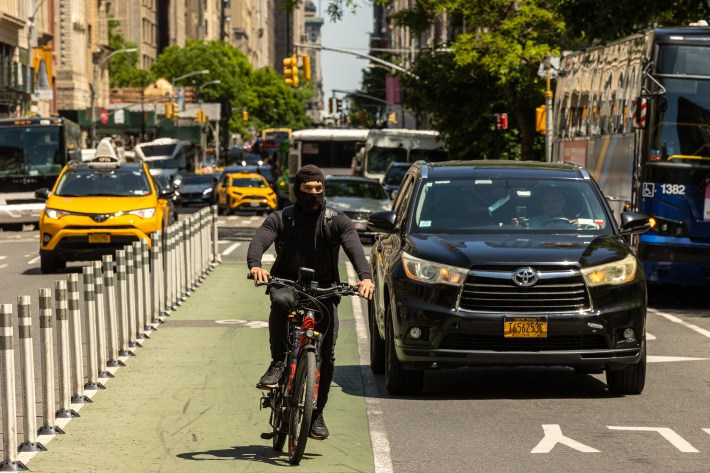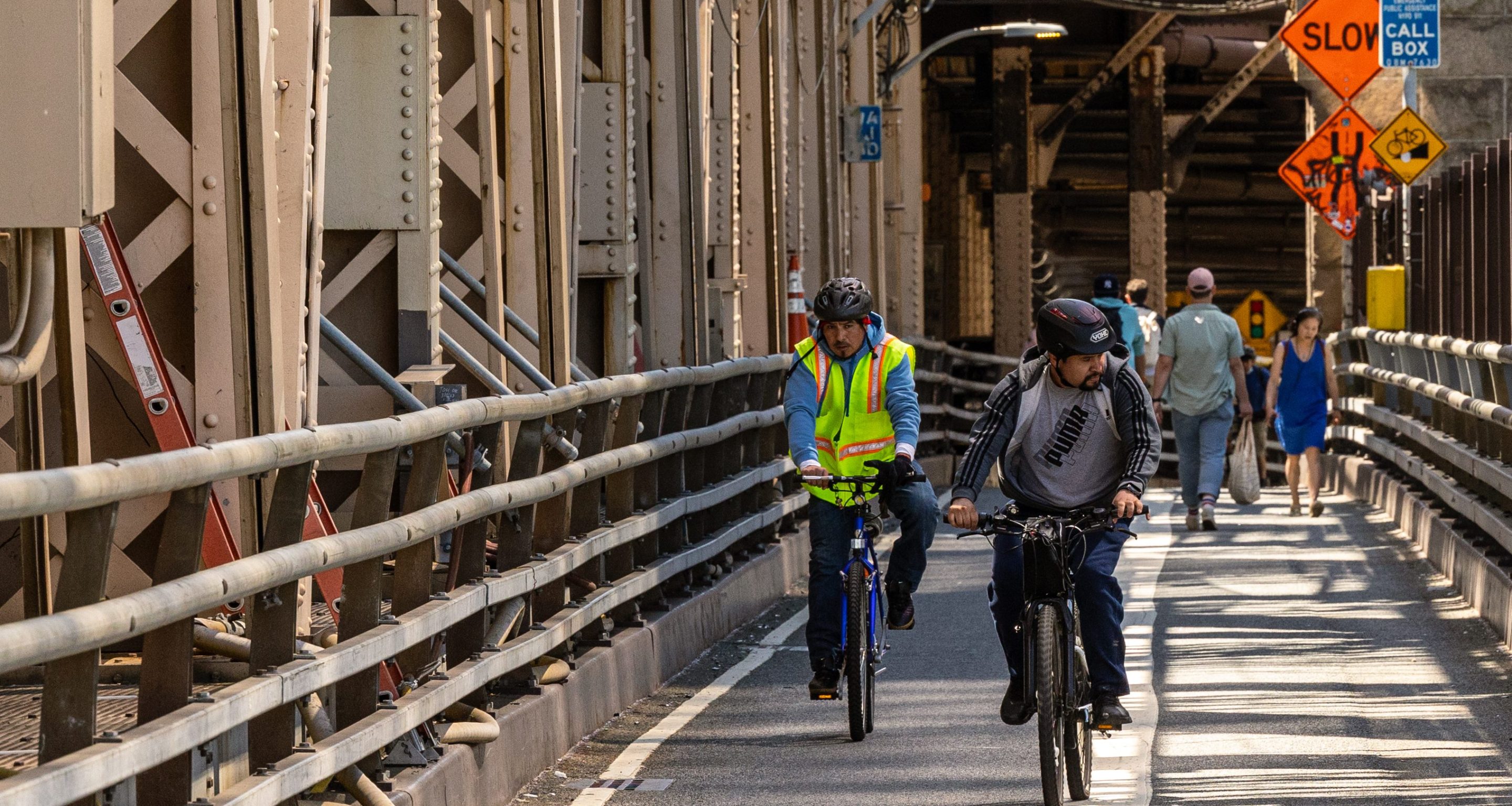When I first started delivering, I learned that a disciplined work ethic is necessary to deal with the city's long list of challenges and dangers, from exploitative app companies to the constant threat of traffic crashes.

I worked as a bank risk analyst for an insurance company in Colombia before moving to New York City in 2019 to join my sisters and niece. Many immigrants like me turn to delivery work because it is an accessible way to start making money for people new to the country with families they need to support. But many don't fully understand the risks of working on the roads full-time; most New Yorkers who rely on food delivery don't even realize what life is like for the people delivering that food. Last year, we lost 18 deliveristas to traffic crashes, all people who were rushed through dangerous New York City streets by delivery app companies that compel deliveristas to travel long distances in short periods.
The pay for each trip is often so low (after expenses, deliveristas average around $4 an hour without tips) that there is a financial incentive to move fast and make many deliveries. The pay structure created by delivery apps is set up so that most of the money a deliverista receives on an order comes from tips while the apps pay pennies on the dollar. This leads deliveristas to put themselves in dangerous situations like using sidewalks and going at unsafe speeds so that we can make enough trips to make ends meet. With Los Deliveristas Unidos and Worker's Justice Project, we’ve been advocating for years for the city to implement a minimum pay rate for delivery app workers that will allow us to work safely and make a living wage for the essential work we do.
These conditions are beyond unreasonable; they're unjust. The delivery apps know they can get away with squeezing workers for our labor while paying pennies because we are classified as independent contractors, meaning we have to pay to buy and maintain our bikes without qualifying for minimum wage laws or being eligible for workers’ compensation in the case of theft or crash. On top of all that, the reality is that most deliveristas are immigrants who speak many different languages — Spanish, Bangla, Mandarin — and who aren't aware that organizing to fight against exploitation is even a possibility.
That's why organizing delivery workers is another vital part of my workday and something I take great pride in. I often meet with deliveristas in public areas as we wait for orders and make sure they know their rights and are aware that we at Worker's Justice Project provide resources such as bike tune-ups, resolving app deactivations, and advocacy training. The language barrier makes it difficult for these incredibly hardworking people to have their voices heard, so it means a lot when they come to me for help with translation.

I connect to the delivery apps and begin making deliveries around 8 a.m., like many full-time deliveristas. When each trip pays $2 to $5 with large gaps between orders, it's critical to spend as much time as possible connected to the app. I live in Astoria, Queens, and prefer to stay in my borough when I can, so most of my deliveries throughout the day are in and around Queens. After a full day of delivering, it's often 9 p.m. by the time I have earned enough to head home. I also support all of my coworkers while I'm working, helping when there is a crash, when e-bikes or mopeds are stolen, and when they need help communicating in English.
Our year-round workforce plays an essential part in keeping the city fed, but how our work looks changes a lot with the seasons. People tend to be outside more during the summer, which means fewer deliveries and more crowded and dangerous streets. Winter usually pushes people indoors, causing people to order delivery more often, but that can be a double-edged sword: it provides us with more opportunities to make money, but in a city like New York, hazardous ice, snow, and freezing conditions can be a recipe for disaster.
Working from 8 a.m. to 9 p.m. in extreme cold or heat can be a severe health risk, especially considering there are few places where deliveristas can rest, and we work under a mentally taxing time crunch. The city must take steps to build the infrastructure that can keep a workforce like us safe as we provide such an essential service. At Worker's Justice Project, we've been lucky enough to be working with the city to introduce deliverista Hubs in multiple boroughs, and we hope to turn them into a place for deliveristas to shelter while resting and waiting for orders, as well as to safely charge the e-bikes that many of us rely on.
Having an e-bike wasn't always as popular among delivery workers as it is now. But since the pandemic, the delivery apps recklessly expanded the geographical range we have to deliver to, which means that we often have to go far in incredibly short times, which makes e-bikes a necessity — another reason why it's so important that the workers themselves are taken into account when it comes to transportation infrastructure and how we build the city of the future. Our streets were not designed for micromobility, and there often aren’t safe places to ride. We need wide and protected bike lanes to stay safe and ensure we have room to share the lane with other people biking, or separate micromobility lanes entirely.
Expensive equipment like e-bikes and mopeds, while a necessary part of my day-to-day work, also creates more risk. Many deliveristas have been robbed for their e-bikes and mopeds, which can cost over $1,000. Fifty-four percent of New York City food couriers surveyed by Cornell and the Worker's Justice Project said they have been victims of bike theft, and about 30 percent said they have been physically assaulted during robberies. For a long time, I used my moped during the day to travel as fast as possible, and would switch to my less-expensive e-bike at night to avoid being robbed. The threat of theft forces many vulnerable deliveristas into busy public spaces and onto well-lit roads, but these roads often have more dangerous car and truck traffic. It's a very stressful experience knowing our investments and means of work could be taken from us, and that the apps won't reimburse us if something happens.
Being a deliverista means navigating a world of physical and mental challenges. At the end of the day, I am always proud of my work and even more proud that I get to work alongside inspiring people to change what we recognize to be unjust and unsafe, not just for us as workers, but for New York City as a whole. We all want safer roads, which will require listening to everyone who uses them, including deliveristas.
This story was first published in the Vision Zero Cities Journal as an accompaniment to the Transportation Alternatives "Vision Zero Cities" conference beginning Oct. 18 in New York. Click here for more info or to read more.






